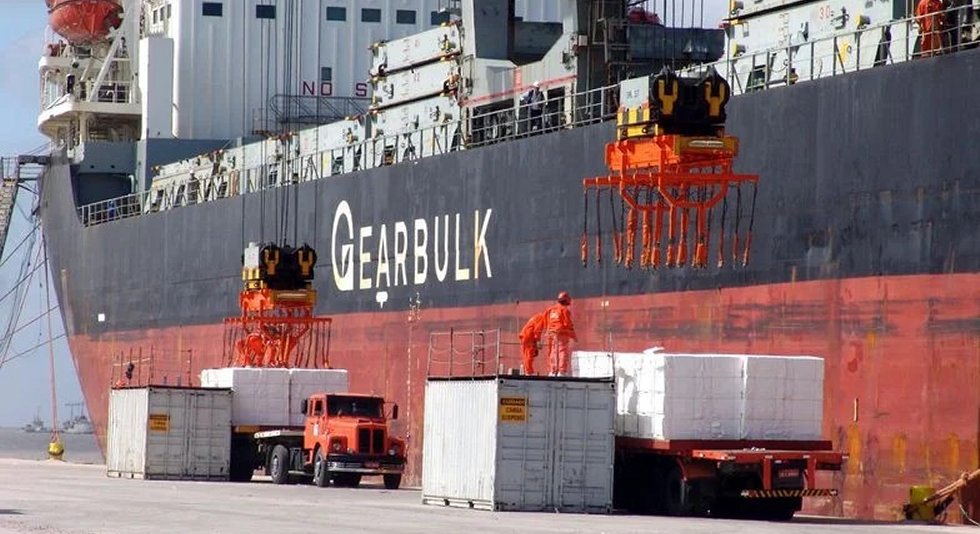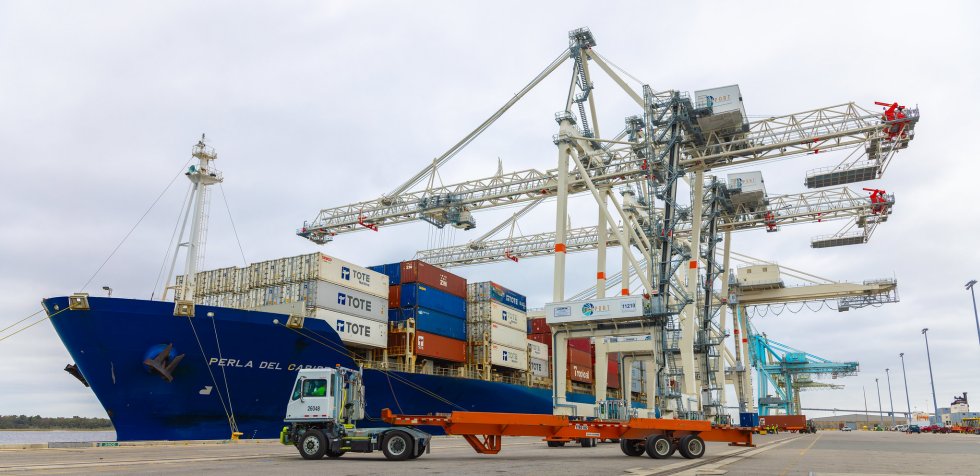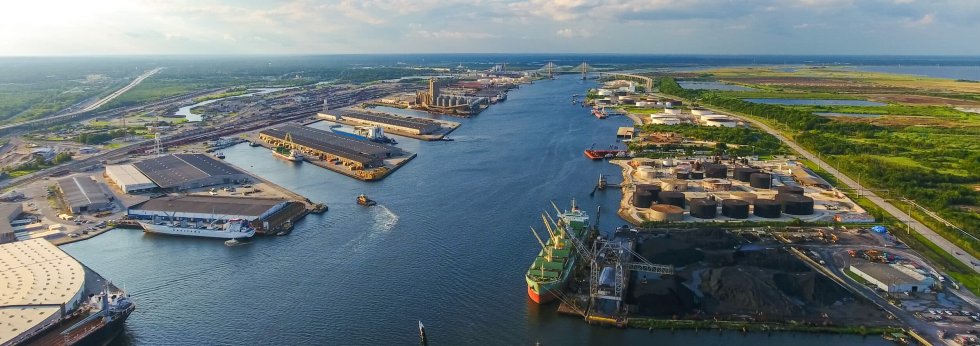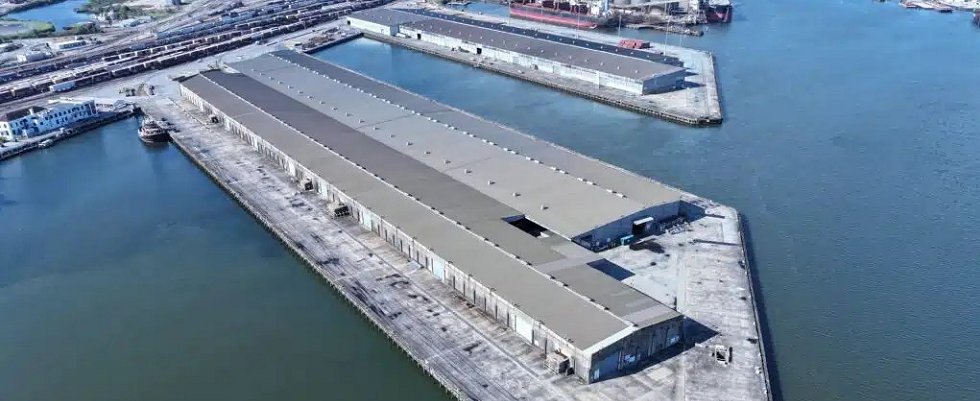|

CMPC and Neltume Ports Form JV to Build Port Terminal in Rio Grande do Sul, Brazil
Jan. 22, 2026 - CMPC Celulose and Neltume Ports have joined forces to form the joint venture Terminal Rio Grande do Sul S/A, with the objective of establishing a terminal dedicated to general cargo handling, focusing on cellulose, in the Port of Rio Grande do Sul.
Early in December, Terminal Rio Grande do Sul obtained, from the National Agency for Waterway Transportation (ANTAQ), after a public consultation, recognition of the viability for entering into an Adhesion Contract. This instrument enables the construction and operation of a Private Use Terminal (TUP) in the municipality of Rio Grande, to be signed between the Ministry of Ports and Airports, as the Granting Authority, and the company.
On Dec. 19, the Adhesion Contract was signed between the National Secretariat of Ports, the Ministry of Ports and Airports, ANTAQ, and Terminal Rio Grande do Sul S/A, granting the company the right to implement and operate its port facilities.
The project foresees the construction of two berths for ships, two berths for barges, and a warehouse with a static capacity of 194,000 tons of pulp, significantly expanding the logistical capacity of the Port of Rio Grande.
Estimated investments total R$ 1.5 billion. During the implementation phase, it is expected to generate more than 1,200 jobs. In the operational phase, the terminal should create approximately 450 direct jobs and more than 2,100 indirect jobs, including casual workers and truck drivers.
The project also includes a transfer of R$ 142.7 million to Portos RS, specifically for the dredging of the Access Channel and the Turning Basin of the New Port, benefiting all cargo handled in this port area.
The next steps include the Transfer of Use of the land, currently being processed by the Superintendence of Federal Assets (SPU). Next, a public hearing is planned, as well as obtaining the Preliminary License and the Installation License from FEPAM/RS.
SOURCE: Portos RS
Portos RS is a public company responsible for organizing, managing, and overseeing the entire waterway port system of the state of Rio Grande do Sul. This system includes the public ports of Rio Grande, Pelotas, and Porto Alegre, as well as 17 privately operated terminals. It comprises over 754 km of navigable waterways with ample capacity to accommodate new industrial complexes. |
|
|

JAXPORT Puts Two New Container Cranes into Service; Third Crane Begins Commissioning
Jan. 12, 2026 - Two new 50-gauge ship-to-shore container cranes moved their first containers recently after entering service at the Jacksonville Port Authority’s (JAXPORT) Blount Island Marine Terminal, expanding cargo-handling capabilities at Florida’s largest container port.
With a lift height of 115 feet, the new cranes are some of the largest 50-gauge cranes currently available on the market. The cranes are designed to serve wider vessels and can reach up to 19 containers across a ship’s deck. Additional features include the ability to move an average of 33 containers per hour and a lift capacity of up to 65 long tons, with heavy-lift capability of up to 75 long tons for oversized, non-containerized cargo.
A third new 50-gauge crane arrived at JAXPORT in early December and is currently being commissioned at the port’s Talleyrand Marine Terminal, where it will be operational in mid-2026. This crane features a 100-foot lift height and can reach across 17 containers wide.
The three cranes were purchased as part of a multi-year, $93 million initiative to modernize JAXPORT’s crane fleet, including $53 million in state funding over the past two years for crane purchases and upgrades.
“As cargo volumes grow, it’s essential that we continue investing in the equipment needed to serve our customers efficiently,” said JAXPORT CEO Eric Green. “We appreciate our partnerships with Governor Ron DeSantis, the Florida Legislature, and the Florida Department of Transportation in helping position JAXPORT for future growth that supports jobs and commerce across the region and state.”
The cranes feature regenerative power systems, which consume energy during container lifts and capture electricity when lowering them—enhancing energy efficiency and reducing emissions.
Located in the heart of the Southeast U.S., JAXPORT is Florida’s No. 1 container port by volume and one of the nation’s top vehicle-handling ports. JAXPORT offers fast and efficient vessel operations with a 47-foot deepwater shipping channel, two-way ship traffic, and same-day access to 98 million U.S. consumers.
SOURCE: Jacksonville Port Authority’s (JAXPORT) |
|

Exclusive Early Registration for IFPTA Members Opens January 23 for FPTS 2026
Jan. 21, 2026 - The Forest Products Transport Symposium (FPTS 2026) is gearing up for an exceptional inaugural event, bringing together leaders, innovators, and professionals from across the forest products transportation sector. We are excited to be hosting the symposium at the Grand Golf Resort & Spa, in Point Clear, Alabama (USA) in partnership with the Port of Mobile. This symposium will deliver expanded programming, enhanced networking opportunities as well as both a pickleball and golf tournament.
In advance of the general public, IFPTA members will receive exclusive early access to register on Friday, January 23, 2026.
This early-access window allows members to secure their symposium participation, take advantage of the Super Early Bird pricing available through March 1, 2026, and register for limited-capacity events before they sell out. With growing demand and limited availability, early registration is strongly recommended.
Link to symposium website: cvent.me/yN4eqw
High-Demand Special Events & Sponsorships
FPTS 2026 features two signature events that are sure to attract strong interest:
- Pickleball Tournament – A fun and fast-growing networking event. Player spots are limited to 32 and expected to fill quickly.
- Golf Sponsorships – A premier networking opportunity with limited sponsorship opportunities available.
These events are available on a first come, first served basis and are anticipated to reach capacity quickly during the early registration period. IFPTA members are encouraged to register promptly.
Hotel Accommodations
 A dedicated block of hotel rooms has been reserved for #FPTS2026 attendees at the special conference rate. Our exclusive discounted conference rate for our delegates starts at $285.00USD/night plus taxes and resort fees. Rooms are offered on a first come, first served basis, and once the block reaches capacity, additional availability and preferred rates cannot be guaranteed. Members are encouraged to book accommodations immediately after completing their registration following the links provided in the registration process. A dedicated block of hotel rooms has been reserved for #FPTS2026 attendees at the special conference rate. Our exclusive discounted conference rate for our delegates starts at $285.00USD/night plus taxes and resort fees. Rooms are offered on a first come, first served basis, and once the block reaches capacity, additional availability and preferred rates cannot be guaranteed. Members are encouraged to book accommodations immediately after completing their registration following the links provided in the registration process.
Why Register Early?
Early registration ensures attendees receive the best pricing, the widest selection of event options, and priority access to sponsorship opportunities.
What’s Next?
IFPTA members will receive a direct email on Friday, January 23rd, 2026, with the official registration link. Please have your IFPTA Membership Number handy, as this is required to secure the discounted member pricing.
General registration for all attendees will open on Monday, January 26th, 2026.
FPTS 2026 is shaping up to be one of the most valuable gatherings for professionals across our industry. IFPTA members are encouraged to take advantage of this exclusive opportunity and secure their participation as soon as registration opens. |
|

Alabama Port Authority Launches General Cargo Modernization Program with $100 Million Pier B South Redevelopment
Dec. 12, 2025 - The Alabama Port Authority has begun demolition and reconstruction of Pier B South, launching a multi-year, multi-phase program to modernize the Port of Mobile’s general cargo terminal—one of the Port’s most historic and versatile assets.
Built in the 1920s, Pier B South has served Alabama industries for nearly a century. Through a $100 million federal investment championed by Senator Richard Shelby, the Port is transforming the aging facility into a modern, high-capacity berth to support the state’s growing breakbulk trade.
“Pier B South has stood for nearly a hundred years as a symbol of Alabama’s global trade gateway through the Port of Mobile, and now we’re investing to ensure it remains an engine for the next hundred years,” said Doug Otto, Director and Chief Executive Officer of the Alabama Port Authority. “From steel producers like SSAB, Outokumpu, Nucor, and Arcelor Mittal to forest products suppliers like Great Southern Wood Preserving, International Paper, and Georgia-Pacific, we are building the Port to serve Alabama businesses who continue to invest and expand production right here in our state.”
The new Pier B South will feature 1,500 linear feet of modern dock structure built to handle 1,500 pounds per square foot (psf) and accommodate mobile harbor cranes and other advanced cargo-handling equipment. The facility will be rail-served, shore-power capable, and designed for seamless integration with the Port’s general cargo complex.
RJ Baggett Construction is leading the construction, which will take approximately three years to complete.
The Pier B South project marks Phase I of the Port’s broader General Cargo Modernization Program, a multi-year initiative to enhance capacity, efficiency, and sustainability across the Port’s breakbulk operations.
Additional program elements now underway include:
- Warehouse Upgrades – Modernizing storage and cargo-handling facilities to support higher throughput and improve operating efficiency, targeting an increase of 110,000+ square feet by H1 2026.
- Harbor Optimization Study – In partnership with the U.S. Army Corps of Engineers, the Port is pursuing federal funding to leverage existing navigational assets, evaluate barge-lane feasibility, and study Mobile River depth, flow, and tidal impacts, ensuring the Port remains competitive for a wider range of vessels.
- General Cargo Infrastructure Strategy – A long-term planning effort to prioritize future capital investments, integrate intermodal connectivity, and expand the Port’s service to Alabama-based manufacturers and exporters.
“From warehouse improvements to a harbor optimization partnership with the Corps, every piece of this strategy ties back to a single goal — serving Alabama industry, because when companies invest hundreds of millions of dollars in the state, it’s our responsibility to ensure their Port keeps pace with their growth,” Otto said.
The Port of Mobile is on track to become the deepest container terminal in the Gulf, with its channel deepening and widening project slated for completion this summer. As the fastest-growing U.S. container terminal over the past five years, the Port is advancing over $1 billion in capital projects across the state. The Port is the nation’s largest breakbulk steel terminal and ranks second in non-containerized forest product shipments. Additional investments include an interterminal connector bridge for on-dock rail, a logistics park, and modernization of general cargo piers. Located in the northern Gulf, the Port offers direct access to five Class I and four short-line railroads, 15,000 miles of inland waterways, an international airport, and Interstates 10 and 65—delivering seamless connections across North America.
SOURCE: Alabama Port Authority |
JAXPORT Welcomes Juan Pablo Acosta Magaña as New Cargo Sales Director Serving Latin America
 Sept. 2, 2025 - Juan Pablo Acosta Magaña has joined JAXPORT’s Commercial team as Director of Cargo Sales for Latin America. In this newly created position, he is responsible for strengthening commercial ties between Jacksonville and containerized cargo customers in South America, Central America, Mexico, and the Caribbean. He also focuses on cultivating strong relationships and delivering high-level service to industry decision-makers in the region. Sept. 2, 2025 - Juan Pablo Acosta Magaña has joined JAXPORT’s Commercial team as Director of Cargo Sales for Latin America. In this newly created position, he is responsible for strengthening commercial ties between Jacksonville and containerized cargo customers in South America, Central America, Mexico, and the Caribbean. He also focuses on cultivating strong relationships and delivering high-level service to industry decision-makers in the region.
With 20 years of international trade and logistics experience, Juan Pablo has worked extensively throughout Latin America helping shippers connect with global markets. His career includes sales and customer service roles at some of the world’s largest ocean carriers, including Maersk Line, Hamburg Süd, and Hapag-Lloyd. In addition, his background in freight forwarding and shipper supply chain optimization gives him a comprehensive understanding of the global supply chain.
A native of Venezuela, Juan Pablo holds a Master of Science in Logistics and Supply Chain Management from Florida International University and a Bachelor of Science in International Commerce from Universidad Alejandro de Humboldt. He is fluent in Spanish and English.
Located in the heart of the Southeast U.S., JAXPORT is Florida’s No. 1 container port by volume and one of the nation’s top ports for vehicle handling and breakbulk. Jacksonville offers efficient vessel operations, including a 47-foot deepwater harbor with two-way ship traffic, and same-day access to 98 million U.S. consumers.
Located in the heart of the Southeast U.S., JAXPORT is Florida’s No. 1 container port by volume and one of the nation’s top ports for vehicle handling and breakbulk. Jacksonville offers efficient vessel operations, including a 47-foot deepwater harbor with two-way ship traffic, and same-day access to 98 million U.S. consumers.
SOURCE: Jacksonville Port Authority (JAXPORT) |
|
|